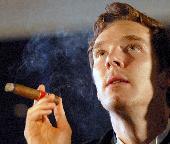SITE GUIDE
SEARCH
REVIEWS
REVIEW ARCHIVES
ADVERTISING AT CURTAINUP
FEATURES
NEWS
Etcetera and
Short Term Listings
LISTINGS
Broadway
Off-Broadway
NYC Restaurants
BOOKS and CDs
OTHER PLACES
Berkshires
London
California
New Jersey
DC
Philadelphia
Elsewhere
QUOTES
TKTS
PLAYWRIGHTS' ALBUMS
LETTERS TO EDITOR
FILM
LINKS
MISCELLANEOUS
Free Updates
Masthead
Writing for Us
A CurtainUp  London Review
London Review
 London Review
London ReviewThe Arsonists
|
It's not easy these days, lighting a cigarette. Everyone thinks the whole world is about to go up in flames.—Biedermann
|

Benedict Cumberbatch as Eisenring
(Photo: Credit Pau Ros)
|
Frisch's play is based in a town which has suffered from a series of attacks from Arsonists. Gottlieb Biedermann (Will Keen) is a typical member of the bourgeoisie, with a respectable house, moneyed job and obedient wife. His only weaknesses are intangible ones: conformity of attitudes and vulnerability to manipulation within his limited sphere of experience. When his own house is infiltrated by a couple of homeless men seeking shelter, he exercises his humanistic, sentimental idealism in spite of some simmering suspicion that these men are arsonists. He calculates that a dinner invite will befriend them and defuse any threat or feeling of difference between them ("Rich or poor, we're all human beings — even the middle classes.") Whilst Biedermann is unable to expel, thwart or even fathom his visitors, they wheedle, persuade and exploit him with catastrophic results.
The cast handle these parts which combine heavy, allegorical undertones with blatant humour extremely well. The three main protagonists are particularly skilled in creating psychological depth for potentially two-dimensional characters. Will Keen's Biedermann is an immaculately attired, although twitchy and pallid character with a reserved, courteous manner. Nevertheless, his manifest weakness means he is difficult to like or sympathize with. Paul Chahidi and Benedict Cumberbatch as the double act of dodgy houseguests are a delight of nihilistic manipulation and easy conquest.
The onstage chorus of firefighters is an always unwieldy element of the play and one which I doubt is actually possible to perform successfully. With a recitative delivery and confused purpose (are they mortal rescuers, semi-divine harbingers of doom or simply witnesses?), their presence never really works in the theatre.
Anthony Ward's set design is a sleekly minimalist white room, with glass walls which rain persistently drizzles down. Although a cool visual effect, the rain also undermines the seriousness of the threat of arson. On the edges of the set are firemen's poles which the chorus impressively enter via a descent. The attic of Beidermann's house is also visible, an area which soon becomes laden with petrol drum courtesy of the two houseguests.
As ein Lehrstück ohne Lehre this play is full of emblematic significance without a specific didactic object. Written in 1958, Communists and Nazis are said to be Frisch's original inspiration, although the play itself is careful not to pinpoint an explicit object of its allegory. This new adaptation follows a similar policy, except for the tellingly translated phrase "wind from the east." This wind, which is referred to as exacerbating fire, is the only vestige of the director Ramin Gray's impetus to interpret the pernicious campaign of the arsonists as Islamic fundamentalism. Other than this, Alistair Beaton's clear translation is successfully, if sinisterly, open to interpretation. The vulnerability of liberalism to categorical devastation is a universal dilemma.
This is an excellent production of an interesting, if difficult, play with its black humour and disquieting possibilities.
|
THE ARSONISTS
Written by Max Frisch Translated by Alistair Beaton Directed by Ramin Gray Starring: Will Keen, Benedict Cumberbatch, Paul Chahidi With: Zawe Ashton, Michael Begley, Jacqueline Defferary, David Hinton, Munir Khairdin, Claire Prempeh, Alwyne Taylor, Graham Turner Design: Anthony Ward Lighting Design: Johanna Town Sound Design: Christopher Shutt Choreography: Hofesh Schechter Running time: 1 hour 30 minutes with no interval Box Office: 020 7565 5000 Booking to 15th December 2007 Reviewed by Charlotte Loveridge based on 13th November performance at the Royal Court, Sloane Square, London, SW1 (Tube: Royal Court) |
|
London Theatre Tickets Lion King Tickets Billy Elliot Tickets Mary Poppins Tickets Mamma Mia Tickets We Will Rock You Tickets Theatre Tickets |




